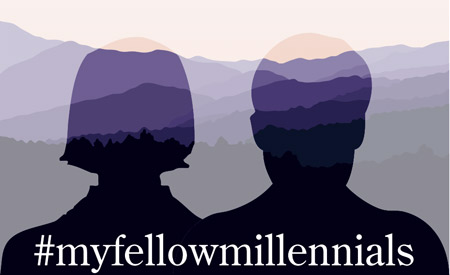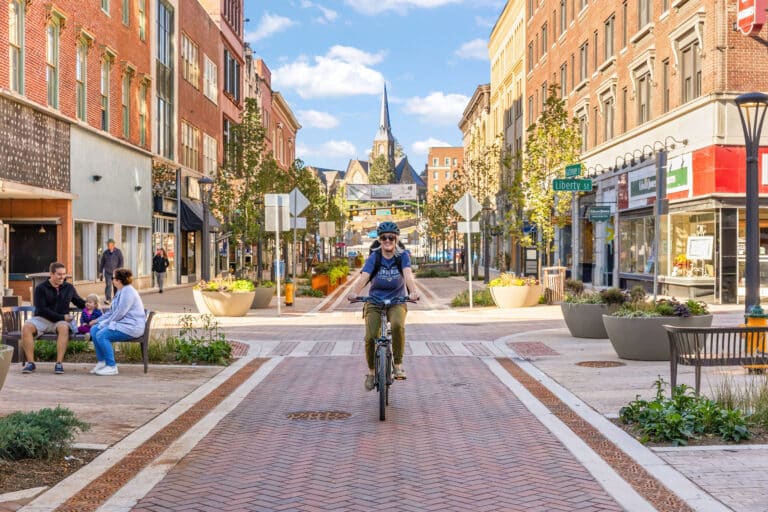The Digital Generation. Echo Boomers. Generation Y. Millennials. Whatever you call those twenty-somethings and early- thirty-year-olds, you likely come into contact with them every day. Born between 1981 and 2000, Millennials comprise roughly one-third of our population, making them the fastest growing demographic in a highly competitive workplace. As if finding a job and getting out of debt wasn’t enough of a concern for these young adults, they have to deal with the ongoing deluge of criticism: Lazy. Narcissistic. Uncreative. Addicted to technology.
I am one of those largely criticized twenty-something-year-olds, and I’Il be the first to admit that I’ve taken these generational bashings to heart. But the Millennials as I know them are a far cry from this warped portrait of young adults.
The following seven Millennials live in our Blue Ridge backyard and share a love of their surroundings. I wondered, going into these interviews, if a vibrating iPhone would interrupt our talks. But what I found as I listened to each individual talk about their passions was a refueling of my own fire.
In an era of instant gratification, Millennials might very well tweet from the tops of mountains or post a photograph of our locally grown dinner on Instagram, but we’re contributing to a movement.
We are students and entrepreneurs, tradesmen and teachers, but in the end, we are all explorers. We emphasize the necessity of engaging with and protecting the natural world. We chase our dreams with a stubborn persistence. We are the future of the mountains. These are #myfellowmillennials.
Ambitious

Meet Hannah Claytor, a 22-year-old graduate student in the Agricultural Resource Economics department at the University of Tennessee in Knoxville. Although she is studying to become an economist, Claytor is a tree hugger at heart. In 2011, Claytor enrolled in a study abroad semester with the National Outdoor Leadership School in India’s rugged Himalayan mountain range. When she returned, she was restless, eager for more. So, in the spring of 2012, she loaded her pack and headed south to Springer Mountain, Ga., to begin her northbound thru-hike of the Appalachian Trail. Although many of Claytor’s undergraduate professors questioned her decision to take a year off from school to “be in the woods,” Claytor says it was anything but a vacation.
“There’s a checks and balance system within me, where I can tell if I’m acting complacent, lazy, or coddled,” Claytor says. “As soon as I recognize that, I try to do something that counteracts and nullifies it.”
Those long months spent trekking in the Himalayas and trudging along on the A.T. would prove to be some of the most challenging and rewarding days of Claytor’s life. She says that in those experiences, she found much more than a sense of connectivity to the natural world.
“I realized I was a bit of a punk,” she says. “I had poured all of my money into this image that I reject now, so when I returned from thru-hiking, it was hard to get back to a society that puts so much focus on monetary value and superficial things. Being healthy and comfortable were the main objectives on the trail, and everyday-life complexities simply weren’t present.”
Claytor adopted the lessons she learned on the trail and integrated those values of simplicity and personal well-being into her daily life. Although she contemplated applying for law school after college, she recognized that a commitment like that might mean sacrificing the small things that make her happy, like being able to go for a trail run after class or spend a weekend backpacking in the mountains. Claytor admits to being an ambitious goal setter, one who thrives in the face of challenge, but she is also realistic about what she can achieve in the short term.
“I think people tend to get into this rut where they have to have big accomplishments all the time, which can be damaging,” she says. “You have to realize that life is about the simple challenges and simple successes.”
The simple successes for Claytor come in all forms, from good quiz grades to resisting a bowl of ice cream for a day. Upon completion of her graduate program, Claytor is planning to thru-hike the Pacific Crest Trail before continuing to pursue her passion in protecting Earth’s natural resources.
Grounded
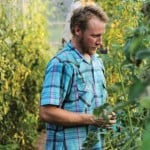
Southwest Virginia native Ben Casteel was just 21 when he finished his thru-hike of the Appalachian Trail in 2006. He had always had a relationship with the land, both in a recreational and practical manner, but he claims that it was this 2,180-mile immersion into the wilderness that opened his eyes to the wonders of the world.
“It was an amazing journey,” he says, “and it’s something that I’m still learning from today looking back on it seven years later.”
After his hike, Casteel headed west. He attended Prescott College in Arizona where he majored in environmental studies with an emphasis on agro-ecology and wilderness leadership. He traveled throughout the region, roaming from Oregon to Wyoming, Idaho, Utah, California, Nevada, Colorado. Wherever he went, Casteel couldn’t get enough of the West with its dramatic landscapes and progressive culture. Yet there was something very important to him that was missing from that scene: his roots.
“The family unit is really why I came back here,” he says, sweeping his arm to take in the mountains surrounding Meadowview, Va. “Nearly all of my family lives within 100 miles, and that’s really important to me, to be able to see them.”
Now, Casteel is the co-owner of Appalachian WildSide, an edible landscaping company that also sells vegetables at the Abingdon Farmers Market and to local restaurants. Casteel created his business in 2012 after working for a number of different landscaping companies that succeeded in making yards pretty, but not practical. His hands are strong and rough with dirt embedded beneath the fingernails, his cheeks rosy from endless hours in the sun, telltale signs of a true steward of the land.
Although many Millennials try to avoid returning home after college, Casteel takes pride in bettering the place where he grew up. In fact, at the top of his lengthy list of life goals, which includes everything from writing and producing a play to climbing the highest peak on all seven continents, is the daunting task of making southern Appalachia food-secure.
“I know it won’t be achieved in my lifetime or by myself by any means,” he says, “but that’s what is important to me and what I want to do with my life.”
Even if Casteel does not accomplish this formidable undertaking, he says that if he enjoys what he is doing every day, if he appreciates the life he has to its fullest, then he would consider himself “successful.”
“My dad was the one that really pressed upon me to live in the present moment,” he says. “That doesn’t mean you can’t look to the future or harness the past. It just means be here now. Once I figure out how to do that, that’s when I’ll be successful, whether I have rags or riches.”
Tough

When you first meet Guy Love, you’d never assume that his humble disposition and unassuming build are just the undercover agents for his hardcore self. At 22 years old, Love is one of only a handful of Millennials in the area who regularly train and compete in ultramarathons (that’s anything over 26 miles). On top of spending upwards of 20 to 40 hours a week running, Love also balances an internship at a physical therapy clinic, a part-time job, and the demands of being a graduate student in Virginia Tech’s Human Resource Development program.
“When I was in undergrad studying philosophy, there was one quote that always stuck with me,” Love says. “It comes from Ovid, and he said, ‘Be patient and tough. Someday this pain will be useful to you.’”
To say Love is both patient and tough is a serious understatement. Blue Ridge, Ga.’s Cruel Jewel 100 is well known as one of the most challenging ultra races in the region. With 60,000 feet of elevation gain and loss in the span of a 100-mile out-and-back course, Love was well aware of some of the obstacles he might face. When the clock started ticking on day one, Love was in a positive mindset. Only 40 hours later, though, Love would barely stumble past the finish line in the predawn dark, weak from exhaustion, soaking wet and cold with blisters covering the bottoms of both feet. Although it would take him nearly three weeks to recover from the race, he says that 100-milers like the Cruel Jewel are his favorite events.
“You really have to find yourself out there,” he says. “You have to find some place, it’s not really mental, not really physical, emotional, or anything like that. You have to tap into that and keep grunting forward.”
Love says he finds happiness “in odd places,” such as those moments of utter pain and despair, when it takes everything he has to place one foot in front of the other. For him, though, physical exhaustion is tangible evidence of his passion and diligence, no matter how fast his time or where he placed.
“It’s a simple act,” he says, “but one that I can suffer through and come out on the other side knowing I worked hard for it. I get some satisfaction from that alone.”
Love recently placed fourth in a 50-miler on the Iron Mountain Trail in Damascus, Va., but not without his share of suffering. When he crossed the finish line after eight hours of running, his body crumbled and he was immediately rushed to urgent care to receive an IV. He recovered and has since completed his 20th ultramarathon since beginning to race in 2010.
Inspirational

Caitlin Brash will always be a climber, but she wanted to do something in the education field. She had worked for the Bureau of Land Management and the U.S. Forest Service, but she fantasized about combining her love of the outdoors with her career interests. Now, at 24 years old, Brash will soon be one of the first Montessori guides in Fayetteville, W.Va. Montessori is an alternate method of schooling, teaching young children to be independent and curious on their own accord. The learning environment is filled with tools and activities that engage students and encourage them to be mindful of others and the natural world around them.
“In learning to be a Montessori guide, I’ve learned some things about myself,” Brash says. “I always knew I’d never be the type to be in a job for the money, but now I know that teaching people to love what I love is what’s important to me.”
Brash grew up in a tight-knit family that shared similar values to the Montessori method. Although she wanted to do well in school, Brash says her parents never pressured her to be the best; so long as she tried her hardest, it was more important that she maintain a hunger for learning new things. Her father, Nick Brash, was one of the region’s early pioneers of rock climbing and helped develop the New River Gorge as a climbing destination. Brash says her respect for and appreciation of the outdoors blossomed in the fourth grade when she started joining her father on climbing excursions.
“Not only was it the thing my dad and I had together and could share, but it was a way to get in touch with nature and see what’s out there,” she says. “It really taught me to respect the environment.”
After graduating from college, Brash moved to Fayetteville to climb and work. When winter came and the rafting scene in town had all but died, she began to see the issues that lie beneath the surface of this seasonal community. The most prevalent and demanding of those issues was the need for a comprehensive alternative to the local K-12 education system, which has consistently ranked in the bottom tier of schools in the United States.
“One generation plants the trees and the next gets the shade,” she says, paraphrasing a Chinese proverb. “It’s crazy that, in such a great outdoor town, recreational programs in the local schools are nonexistent. It’s important to teach others how to be respectful of our environment now because the next generation is going to see our impact.”
Brash has 20 students in her class and works daily with the community of parents in Fayetteville. On any given weekday, Brash can be found guiding her students toward the discovery of new passions through activities such as yoga and river cleanups.
Radical

Taylor Kirkland never dreamed of actually owning his own business. When he returned from a two-year stint in Belize, he thought he would be more interested in studying culture, not business. He applied and was accepted into the Appalachian Studies program at Appalachian State University, concentrating his path on sustainable development.
Throughout his schooling, Kirkland worked a number of contracting side jobs to help pay for his education. Despite his extensive experience in manual labor and love of woodworking, he says that a career in the industry was never on his radar.
“A lot of people degrade manual labor,” he says, “and maybe it’s a cultural thing, but when you think of construction workers in any capacity you think of some dude in a hard hat on the side of the road.”
Kirkland knew firsthand how demanding and tedious trade work like carpentry could be, and he struggled with the disconnect he felt between talented tradesmen as he knew them and that hardhat stereotype. In his second year of graduate school, he decided to combat that disconnect by examining the oral history of Appalachia through the eyes of the region’s finest craftspeople, activists, social entrepreneurs, and artists. His first interview was with agrarian, environmental activist, and writer Wendell Berry.
“The conversation we had really blew my mind,” Kirkland says. “We discussed what it meant to be radical,” a term Kirkland had long associated with his own active involvement in environmental movements.
Berry, then already in his mid-seventies, was a well-known literary figure, but he had only recently begun to publicly denounce issues in Appalachia like strip mining and mountaintop removal. He told Kirkland that being radical is not nearly as extreme as modern society suggests. The word itself is defined as arising from or going to a root or source, so in Berry’s eyes, he was getting more radical by the day.
“He was really trying to hack at the root of problems in this country and in his community,” Kirkland says, “and after that talk, I realized I didn’t need to go to protests to be radical. I can do it at home, and I think that’s where we’re supposed to start.”
Now, at only 30 years old, Kirkland is the sole owner and operator of Appalachian Homestead, a company based out of Black Mountain, N.C. He is a jack-of-all-trades, creating everything from custom wood furniture to energy efficient homes. Kirkland sources locally for a lot of his building materials, using reclaimed wood or old barn slats to add another layer of authenticity and history to his craft. He inspires his community, one customer at a time, by being a reliable, talented, and locally sustainable businessman.
“For me, radical is getting deeply rooted in place,” he says.
Patient
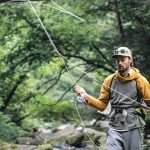
25-year-old Justin Douty of Buena Vista, Co., is the first to admit that he’s not typically a very patient person. But throughout his life, he has been surrounded by the culture of the mountains. Douty has spent the past year working in Fayetteville, W.Va., as the kitchen manager for a local restaurant, the Secret Sandwich Society. While this is by no means what he would consider a “dream job,” he takes solace in the ability to live where he can pursue his passions for paddling, climbing, mountain biking, and most importantly, fly-fishing.
“It’s more than just catching a fish,” Douty says as he leisurely casts his line into the water. “It’s artistic. A painter with a paintbrush is like a fly fisherman with his cast.”
On any given day, Douty is typically at the restaurant long before it opens, prepping food and ordering supplies for the days ahead. When the summer rafting season starts, Douty says the restaurant scene can become chaotic and stressful.
“I have a pretty busy brain, but fly-fishing forces it to stop and focus on the one task in front of me and not be everywhere at one time,” he says. “You can feel the fish and the struggle the fish is battling. You fight that fish, and maybe it’s insignificant at the end, but it could symbolize the struggle you had that day or in life.”
Douty is a Millennial who opted out of college after graduating from high school. Although he did spend a couple years taking college courses, he ultimately dropped out, recognizing that he would be better suited to find his passion in the world than in the classroom. His decision, which he struggles with at times, has helped him adapt to a wide variety of work environments, from guiding zipline tours to painting houses.
“The days I feel most content are the days where I end up feeling pretty beat down,” he says. “Even if it’s just a fun day playing on the river or on the rock, I want to feel like I used my mind and my body.”
He says that even if he struggles with patience in his day-to-day affairs, his interactions with the great outdoors remind him of his place in the world and the importance of being proactive in pursuing the things you love in any capacity.
“Live life and love life,” he says, looking down at his tattooed version of the quote. “All in all, it’s a battle to do that every single day, but it’s the very small things, like a simple breeze, that are often overlooked and taken for granted.”
Fearless
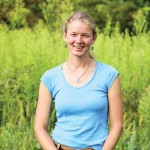
At 29 years old, Rachel Williamson is one of just a few young farmers whose main income comes from selling her products every Saturday at the farmers market in Charlottesville, Va. Her parents were back-to-the-land homesteaders in the Blue Ridge, so she’s had a longstanding relationship with the natural world. After working a number of jobs as a field biologist and as an outdoor educator, Williamson realized the one thing she was lacking in her career was, quite simply, her home.
“I didn’t want to commute 10 hours a week to and from town, but I did want to find a way to be here on this land and make my living here,” she says, “so I took any interest I ever had and tried it out.”
Now, Williamson is the one-person-show of Fairweather Farm where she grows, harvests, and dries her own tea blends. She also fashions baskets from tulip poplar bark and sells them at local craft shows. Although she typically works seven days a week, 16 hours a day, it’s impossible to catch her around the farm without a smile on her face.
“That connection to the earth is what feeds me,” she says. “I think a fear of failure prevents a lot of people from trying something new. Nut you should be okay with not being perfect at something. It’s a big responsibility to be 100 percent entirely responsible for your life, but I love that because it also gives me the freedom to create that happiness for myself.”
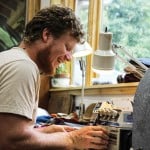
Her older brother Ryan shares his sister’s sentiments on life, happiness, and work. Ryan began his own business making recycled fleece hats when he was just a freshman in high school. Now that same business, The Mouse Works, as well as his 80-some beehives, remain Ryan’s sole sources of income.
“It seems our culture has a big push toward always growing and growing bigger,” Ryan says, “but I don’t want that. I want free time to do the things I love.”
Despite working long hours in the field harvesting spices or in the shop bent over a sewing machine, both Rachel and Ryan still find time to indulge in their other passions, like adventure. A few years ago, the pair set off in their kayaks down the New River, paddling from its headwaters in Snake Mountain, N.C. to its ending point in Ohio. Ryan has also section-hiked multiple trails, including the Appalachian Trail, the Long Trail, and the Pacific Crest Trail. Rachel and her father recently repeated a similar long-distance kayaking trip, this time paddling from the nearby Moormans River to Jamestown, Va. She says that whether she is working on the farm or playing outside, her main objective is to find balance, something she defines as the “perfect trifecta” of providing for herself, for others, and for the land.
“Our lives are precious and short and we should work as hard as we can to figure out how to live them fully,” she says. “There’s nothing wrong with that. There’s everything right with that, because in the end, if you love what you’re doing, it’s going to bring more joy to everyone else as well.” •
